







 |
T-E-A-T-O-N-I-C
SULPHUR AS NUTRIENT IN TEA SOIL
|
According to current research, Sulphur along with Nitrogen, Potash and Phosphate, is an essential nutrient for optimal growth and sustainable higher productivity of tea. In some situations, Sulphur requirements may be considerably high, as with other nutrients, depending on sulphur status of tea soils. | |  |
SYMPTOMS OF SULPHUR DEFICIENCY IN TEA
Sulphur deficiency develops because of continous absence of Sulphur as an input, particularly by the use of sulphur free fertilizers and other inputs. Sulphur deficiency may exist in a state of "Hidden Huger". However the external symptoms of chronic Sulphur deficiency include the uniform chlonic yellowish colour of tea leaves, particularly of young leaves. The deficiency symptoms become more pronounced under conditions of moisture stress, and unless these defeciencies are removed, the utilization of nitrogen and other nutrients will not at their optima. Overall, the physiological functions of tea are adversely affected, particularly the synthesis of protein for higher productivity. It is clear therefore that for sustainable higher productivity of tea, sulphur is an essential imperative. TEATONIC provides this all important nutrient, and its effects are positively multidimentional. These include:
-
Helping in protein synthesis in tea much in the same way as nitrogen does, and thereby increasing harvestable shoots by volume and weight.
- Increasing soil fertility and mantaining soil pH at its optimum.
- Reducing the incidences of some pests, termites in particular.
TEATONIC AS A NUTRIENT
TEATONIC is a natural product for integration with fertilizer practices. TEATONIC amends the soil by bringing up its fertility level and raises the availability of some nutrients, particularly nitrogen. Field research confirms that 20 to 60 kg per hectare of TEATONIC enhances tea yields by at least 15 per cent in highly productivity areas and 30% in severly sulphur-deficit areas.
The fine particles of TEATONIC cover large surface area and hasten sulphate formation.The highly micronized TEATONIC takes care of sulphur utilization by tea plants in a way that no comparable products are capable of achieving. Physiological studies have confirmed that Sulphur being a constituent of amino acid cystine and methionine, the application of TEATONIC increases con-centrations of these compounds in tea, and in turn this is reflected in higher productivity. The additional advantages of TEATONIC include enhancement of nitrogen utilisation and mantaining the pH of tea soils at its optimum- the two major factors in soil productivity and fertility for tea soils.
TEATONIC AS A TERMITICIDE AND FUNGICIDEk ?
TEATONIC has a strong termiticidal and fungicidal properties. TEATONIC is therefore a good replacement for copper fungicides and can be applied straightaway to the plants preferably after a plucking round.
TEATONIC because of high content of elemental Sulphur is highly effective against soil termites. 30-40 kg/ha of TEATONIC will not only effectively control termites, but will also stabalise soil pH which gets disturbed due to prolonged termite infestations.
TEATONIC is non toxic to plants when applied at recommended dosages and is eco-friendly. Recent research shows it does not adveversely affect the predators of pests. Being biologically safe, it is exempted from the satutory requirement for its residue clearance in tea by EPA.
| TEATONIC DATA BASE |
| Elemental Sulphur | 85% Min. |
| Formulation | Dispersable Powder |
| Action | Direct by Contact |
| Vapour Pressure | 3.96 x 10-6 at 2 oC |
| Oral Toxicity | 5000 mg/kg B.W. |
| Fish Toxicity | 1000 mg/kg B.W. |
| Bird Toxicity | Safe |
| Enviromental Toxicity | None |
| Manganese | 20 - 60 kg/ha |
| Application Rate | Depending on avilable Sulphur
Status of soil. |
ppm of available
Sulphur in soil | Rate of application
kg/ha of Teatonic |
| 0-20 | 60 |
| 21-30 | 40 |
| 31-40 | 20 |
| TEATONIC 85% |
|



